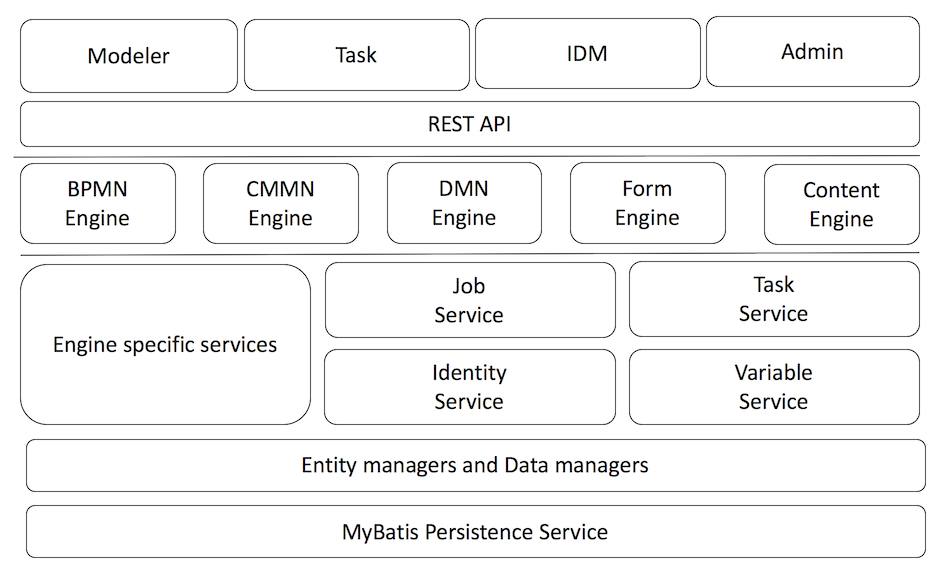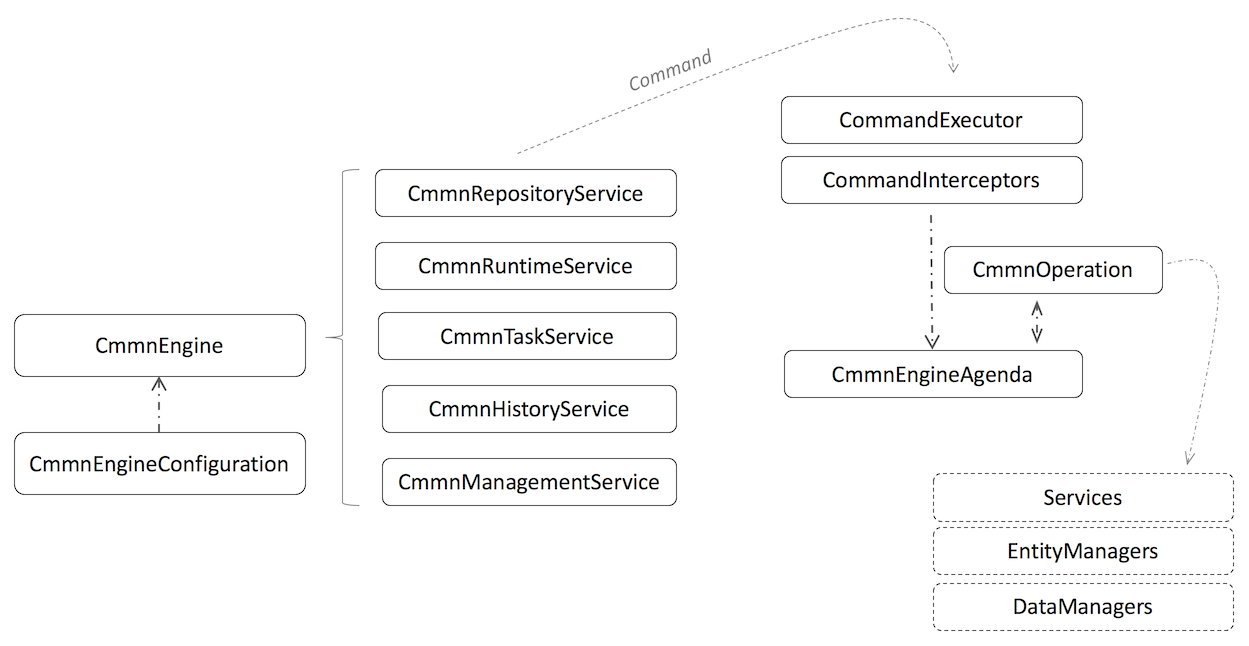架构
本章从高层次的角度简要介绍 CMMN 引擎的内部结构。当然,由于 CMMN 引擎代码是开源的,通过深入研究源代码可以找到实际的实现细节。
CMMN 引擎(如下图所示)是 Flowable 引擎生态系统中的一个引擎,其设计方式与其他引擎类似。CMMN 引擎建立在 CMMN 特定服务和共享服务之上:任务、变量、身份和作业服务,这些服务独立于引擎。在较低层面,实体和数据管理器层负责处理底层持久化,这与其他引擎相同。

通过使用共享服务,这也意味着来自 BPMN 和 CMMN 引擎的任务最终会聚合在一起,可以通过相同的 API 进行查询和管理。异步执行器也是类似的:定时器和异步作业使用相同的逻辑,甚至可以由中央执行器管理。
共享服务架构有第二个好处。当引擎一起使用时(这种情况很常见),引擎会尽可能共享资源,数据库事务会跨越多个引擎操作的调用,查找缓存是通用的,持久化独立于引擎本身处理。
CMMN 引擎的设计原则与 Flowable 项目的其他引擎相同。下图给出了使用 CMMN 引擎时涉及的不同组件的高层次概述:

从高层次来看:
CmmnEngine 实例是从 CmmnEngineConfiguration 创建的。配置实例可以通过配置文件或以编程方式创建。
CmmnEngine 以服务的形式提供对 Flowable CMMN API 的访问:CmmnRepositoryService、CmmnRuntimeService、CmmnTaskService、CmmnHistoryService、CmmnManagementService。这些服务的命名和职责与其他引擎类似。
每个 API 方法都会转换为一个 Command 实例。这个 Command 实例被传递给 CommandExecutor,后者会让它通过一系列 CommandInterceptors。这些拦截器有各种职责,包括处理事务。
最终,Command(除非是纯数据修改 Command)通常会在 CmmnEngineAgenda 上计划一个 CmmnOperation。
操作会从 CmmnEngineAgenda 中获取,直到没有更多操作为止。通常,一个操作会作为其逻辑的一部分计划新的操作。
操作中的逻辑将调用较低层次的服务和/或实体管理器。
BPMN 和 CMMN 引擎之间的一个重大区别是 BPMN 引擎通常是"局部的":引擎查看当前状态,检查流程中的下一步并继续(当然这是一个简化说法,有很多操作并不适用这种情况,但从概念上做出区分是正确的)。CMMN 引擎的工作方式不同:在 CMMN 中,数据扮演着重要角色,数据的变化可以在案例定义的各个地方触发许多事情。因此,每当发生变化时,EvaluateCriteriaOperation 都会被频繁地计划和执行。当引擎检测到重复或无用的评估时,会对这些评估进行优化。
CMMN 引擎工作的核心是 Plan item instance(计划项实例)的概念,它表示当前在案例中"活跃"的计划项及其状态。与 BPMN 很不同的是,CMMN 为计划项定义了严格的状态生命周期。这体现在 CmmnRuntimeService 方法、查询 API 和 PlanItemInstance 对象的数据字段部分中。
可以通过为议程包设置调试日志来检查议程、操作以及计划项实例的处理方式。例如,当使用 log4j 时:
log4j.logger.org.flowable.cmmn.engine.impl.agenda=DEBUG
这会产生如下日志:
Planned [Init Plan Model] initializing plan model for case instance bfaf0e64-eaf4-11e7-b9d0-acde48001122
Planned [Change PlanItem state] Task A (id: planItemTaskA), new state: [available] with transition [create]
Planned [Change PlanItem state] PlanItem Milestone One (id: planItemMileStoneOne), new state: [available] with transition [create]
Planned [Change PlanItem state] Task B (id: planItemTaskB), new state: [available] with transition [create]
Planned [Change PlanItem state] PlanItem Milestone Two (id: planItemMileStoneTwo), new state: [available] with transition [create]
Planned [Evaluate Criteria] case instance bfaf0e64-eaf4-11e7-b9d0-acde48001122
Planned [Evaluate Criteria] case instance bfaf0e64-eaf4-11e7-b9d0-acde48001122 with transition 'create' having fired for plan item planItemTaskA (Task A)
Planned [Evaluate Criteria] case instance bfaf0e64-eaf4-11e7-b9d0-acde48001122 with transition 'create' having fired for plan item planItemMileStoneOne (PlanItem Milestone One)
Planned [Evaluate Criteria] case instance bfaf0e64-eaf4-11e7-b9d0-acde48001122 with transition 'create' having fired for plan item planItemTaskB (Task B)
Planned [Evaluate Criteria] case instance bfaf0e64-eaf4-11e7-b9d0-acde48001122 with transition 'create' having fired for plan item planItemMileStoneTwo (PlanItem Milestone Two)
Planned [Activate PlanItem] Task A (planItemTaskA)
Planned [Change PlanItem state] Task A (id: planItemTaskA), new state: [active] with transition [start]
Planned [Evaluate Criteria] case instance bfaf0e64-eaf4-11e7-b9d0-acde48001122 with transition 'start' having fired for plan item planItemTaskA (Task A)
Planned [Change PlanItem state] Task A (id: planItemTaskA), new state: [completed] with transition [complete]
Planned [Evaluate Criteria] case instance bfaf0e64-eaf4-11e7-b9d0-acde48001122 with transition 'complete' having fired for plan item planItemTaskA (Task A)
Planned [Activate PlanItem] PlanItem Milestone One (planItemMileStoneOne)
Planned [Change PlanItem state] PlanItem Milestone One (id: planItemMileStoneOne), new state: [active] with transition [start]
Planned [Evaluate Criteria] case instance bfaf0e64-eaf4-11e7-b9d0-acde48001122 with transition 'start' having fired for plan item planItemMileStoneOne (PlanItem Milestone One)
Planned [Change PlanItem state] PlanItem Milestone One (id: planItemMileStoneOne), new state: [completed] with transition [occur]
Planned [Evaluate Criteria] case instance bfaf0e64-eaf4-11e7-b9d0-acde48001122 with transition 'occur' having fired for plan item planItemMileStoneOne (PlanItem Milestone One)
Planned [Activate PlanItem] Task B (planItemTaskB)
Planned [Change PlanItem state] Task B (id: planItemTaskB), new state: [active] with transition [start]
Planned [Evaluate Criteria] case instance bfaf0e64-eaf4-11e7-b9d0-acde48001122 with transition 'start' having fired for plan item planItemTaskB (Task B)
Planned [Change PlanItem state] Task B (id: planItemTaskB), new state: [completed] with transition [complete]
Planned [Evaluate Criteria] case instance bfaf0e64-eaf4-11e7-b9d0-acde48001122 with transition 'complete' having fired for plan item planItemTaskB (Task B)
Planned [Activate PlanItem] PlanItem Milestone Two (planItemMileStoneTwo)
Planned [Change PlanItem state] PlanItem Milestone Two (id: planItemMileStoneTwo), new state: [active] with transition [start]
Planned [Evaluate Criteria] case instance bfaf0e64-eaf4-11e7-b9d0-acde48001122 with transition 'start' having fired for plan item planItemMileStoneTwo (PlanItem Milestone Two)
Planned [Change PlanItem state] PlanItem Milestone Two (id: planItemMileStoneTwo), new state: [completed] with transition [occur]
Planned [Evaluate Criteria] case instance bfaf0e64-eaf4-11e7-b9d0-acde48001122 with transition 'occur' having fired for plan item planItemMileStoneTwo (PlanItem Milestone Two)
Planned [Evaluate Criteria] case instance bfaf0e64-eaf4-11e7-b9d0-acde48001122
No active plan items found for plan model, completing case instance
Planned [Complete case instance] case instance bfaf0e64-eaf4-11e7-b9d0-acde48001122